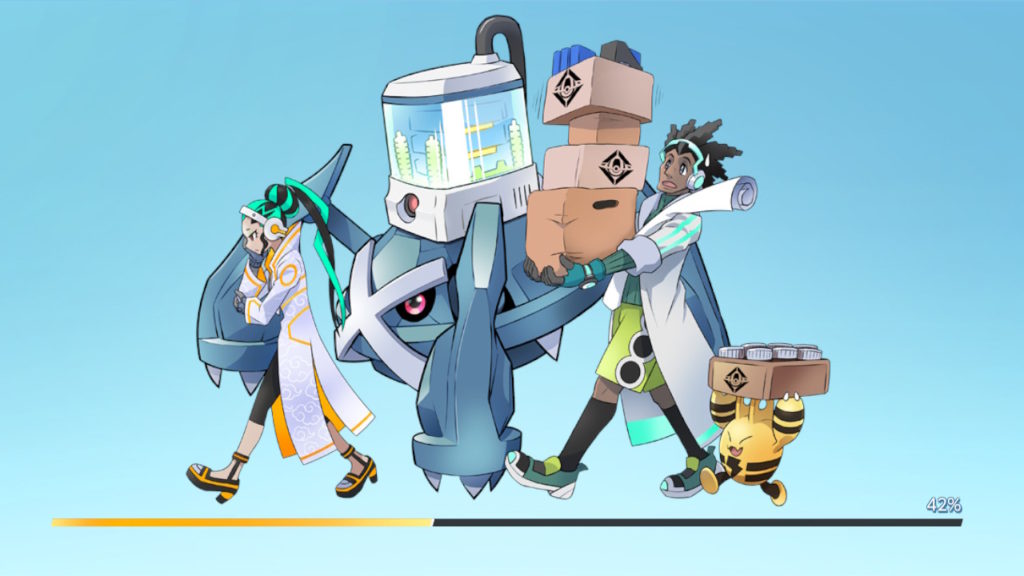
Provided by Nintendo
Why You Won’t Break Up With Your Girlfriend Over Pokémon Unite: A Design Analysis
There once was a young man who, in the depths of his latest obsession, would once ask his girlfriend, into letting him use her work laptop to play League of Legends., He would later turn around and call said laptop a potato, which he had seen as an insult on reddit given to low performing laptops for gaming. There were other instances of similar behavior over the course of that relationship for that young man, but this was one of the ones that stuck out. Regrettably, that young man was me.
Not only have I learned a lot about relationships since then, I’ve also learned a lot about game design, having done talks on humanistic game design, designed meditative games for mindfulness, and now receiving a Master’s. Now, when I play Pokémon Unite, I don’t think it would make me behave the way I did with League. With Pokémon, I would get irritated at the very least, but not become a potato raging gamer. How much of that change was in the game design? Can you design games to make players happier, healthier, and less toxic? In a game played by millions, would some of your players end relationships because of your game’s design?
Let’s take a look.
What is a MOBA?
For those of you who might not know, or as a reminder, Pokémon Unite is one of the latest forays into the MOBA genre, a genre popularized by League of Legends.
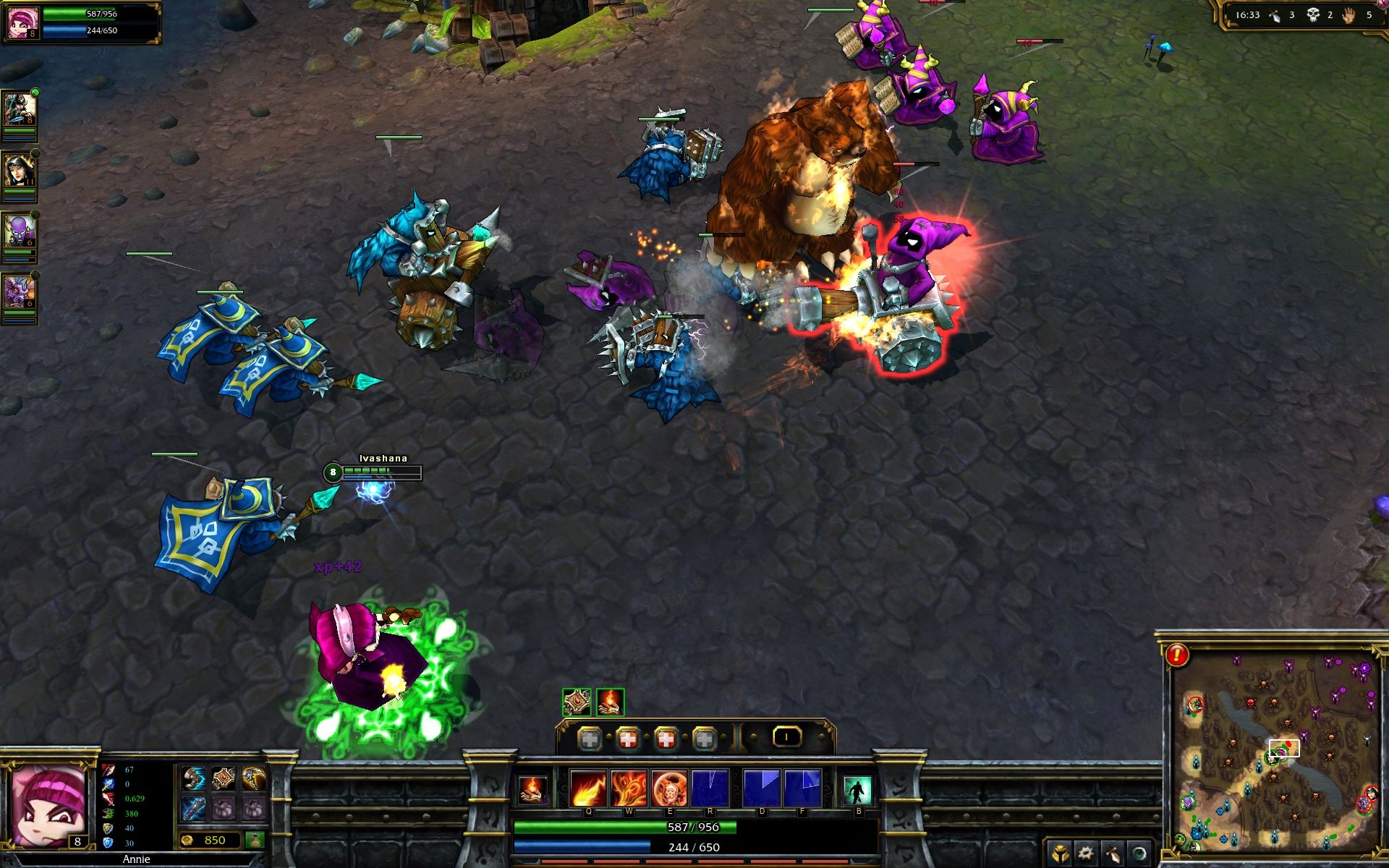
League of Legends (League) is a popular MOBA game where two teams of five players go head-to-head across three lanes, on a predefined battlefield. The game’s goal in its main mode is to push into the enemy central base known as their “Nexus,” and destroy it. In the process, players take down towers, inhibitors, enemy minions, and the enemy team’s players, all in order to level up their characters, upgrade their abilities, and buy better equipment.
It’s a foundational game in the world of esports, comparable to basketball meets Warcraft.
So, would someone break up over something as silly as this? Why would I install it on my company work computer at my first internship? (I never played on it by the way.)
The answer is… complicated.
Initiation
You’re in your late teens, early to mid 20s, generally cis male but not required. You are working through your college degree or maybe don’t have a degree, but you have a lot of free time. A friend invites you over to play League of Legends, and for whatever reason, the randomly generated cocktail of ingredients that happened in your life brought you to this game, and made you invested in winning. Why? Any number of reasons. Maybe it’s a lack of motivation in school or work, frustration with progress in life, low esteem, relief or escape from past trauma, a sense that life is finally delivering you a promise that you felt entitled to. Or maybe it’s just genetic or a personality quirk that scratches your gamer itch. Who knows? The point is that you’re here.
You’re off to the races.
So that’s bad, and Pokémon is better?
League is a game filled with lots of tension, from both the micro level of individual interactions in each second of gameplay to the macro levels of match to match rewards, and all those tensions add up to that cocktail we were talking about. But, the design of Pokémon lends itself to being a lighter cocktail.
Let’s dive into how.
Match times
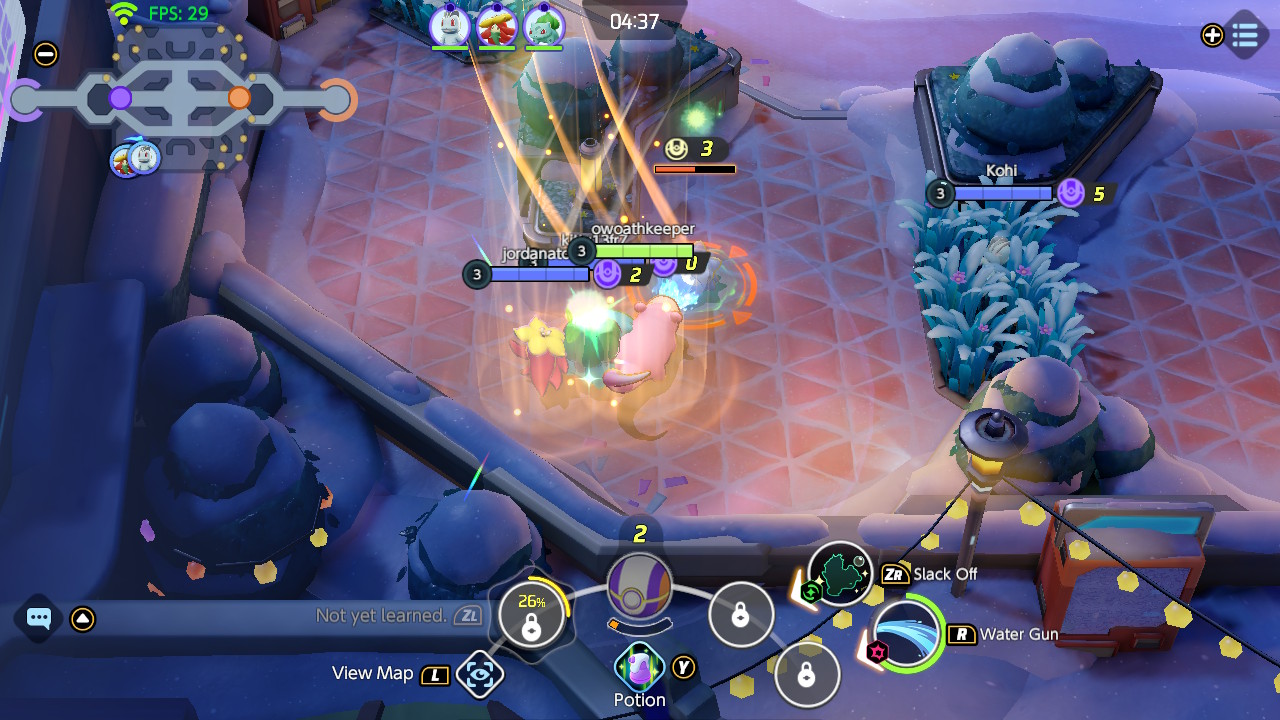
Match times are one of the largest macro-level tensions in the game.
Matches in League don’t have a set amount of time. Whenever a Nexus is destroyed, or a team forfeits, is when the match is over. Typical matches when I used to play would last anywhere from 20 minutes on the short side, to upwards of 70 minutes. The unpredictable nature of matches and matchups maps onto intermittent payout structures, in the vein of chance-based (a la dice, coins, spinners, or slots) reward systems. In the famous Skinner box psychological experiment, a bird presses a button and a food pellet comes out. When it gets a pellet on a regular interval, they press it just enough times to feed their stomach and stop when they’re satiated. However, if the pellet comes out at a randomized schedule, the bird continues to keep pressing the button.
If this sounds familiar, these are the same psychological mechanisms which underlie gacha games, loot boxes, Peggle, or chance-based gambling games like card games, slot machines, roulette, or craps.
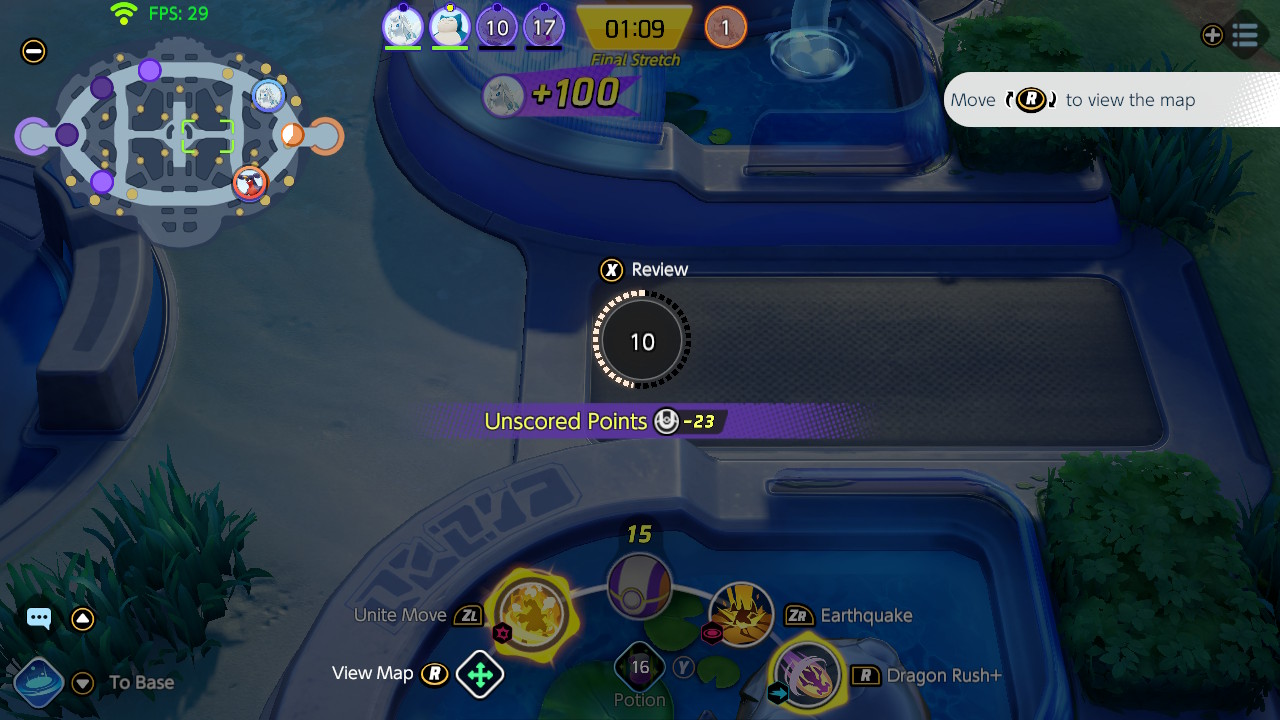
In Pokémon Unite, all that is streamlined. Instead of pushing to the enemy Nexus, the basketball metaphor is taken further, and players in Pokémon Unite score goals on their opponents styled like basketball hoops, which replace League’s towers, inhibitors, and Nexus. The endpoint in Pokémon Unite is the endtime of the match, instead of destroying the enemy Nexus. Standard and ranked matches are a tidy 10 minutes, every time. Quick battles are 5 minutes. It’s the same food pellet every time you press the button. Predictable time schedules, as a result, mean less addiction and rage quitting.
The rest of the gameplay features build a lot of tension. Prolonging tension over a long period of time in League, without a determined outcome can be exhausting, incredibly rewarding, but also devastatingly disappointing. Meanwhile, in the worst case scenario in Pokémon, the tension will always be released after a fixed 10 minutes.
Of course, when spending a lot of time in a match and feeling that sense of denial after a 70 minute game, and there’s an open channel to voice our frustrations to other players, many of us familiar with online gaming know the kind of explosive results that can result…
Communications
League is known for its toxic community, such that even devs have attempted to curb its problems, even this year in April 2021. The designers have said that this usually comes from a minority of bad actors, but that they do affect the community at large. Pokémon as a family friendly game series tries to keep its potentially younger leaning audience protected from such toxicity, such as trolling and hate speech.
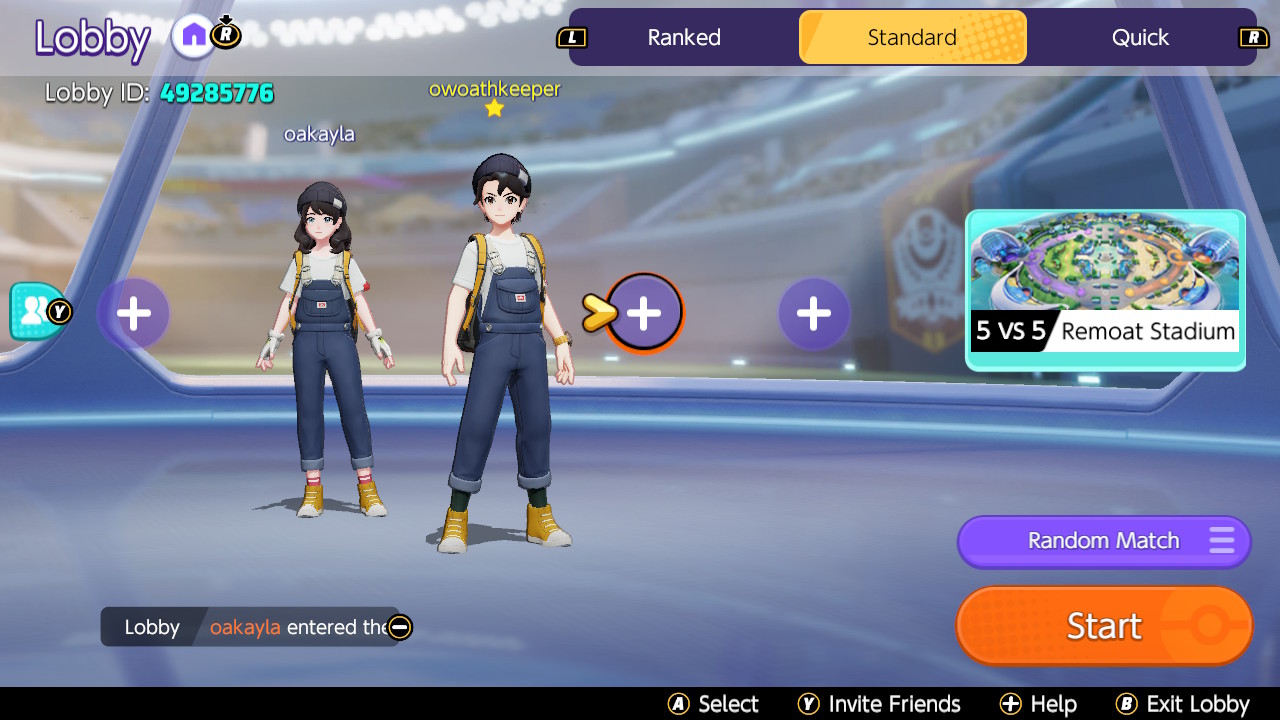
Pokémon Unite developers have opted to remove typing into chat and voice chat. Player interactions are limited to emote wheels, such as calling plays (where players will be on the map, what objectives need to be defended or pushed, what warnings to give) or comments which are generally affirmative language.
In general, the worst comments I found online about the toxicity of the Pokémon Unite community seemed limited to idling, spamming, and online communities outside of the game itself.
A Human Face
Before a match even starts, League of Legends shows you the different players on each team, via champion, their loadout, and their username. Not much in the way of personalization. This has real consequences.
In a variation of the Milgram experiment, subjects were less likely to administer a deadly amount of electricity to another person (an actor) if they could see the person. In an even more dramatic example, the dehumanization of enemies through language and propaganda is one of the factors considered in enabling human rights violations.
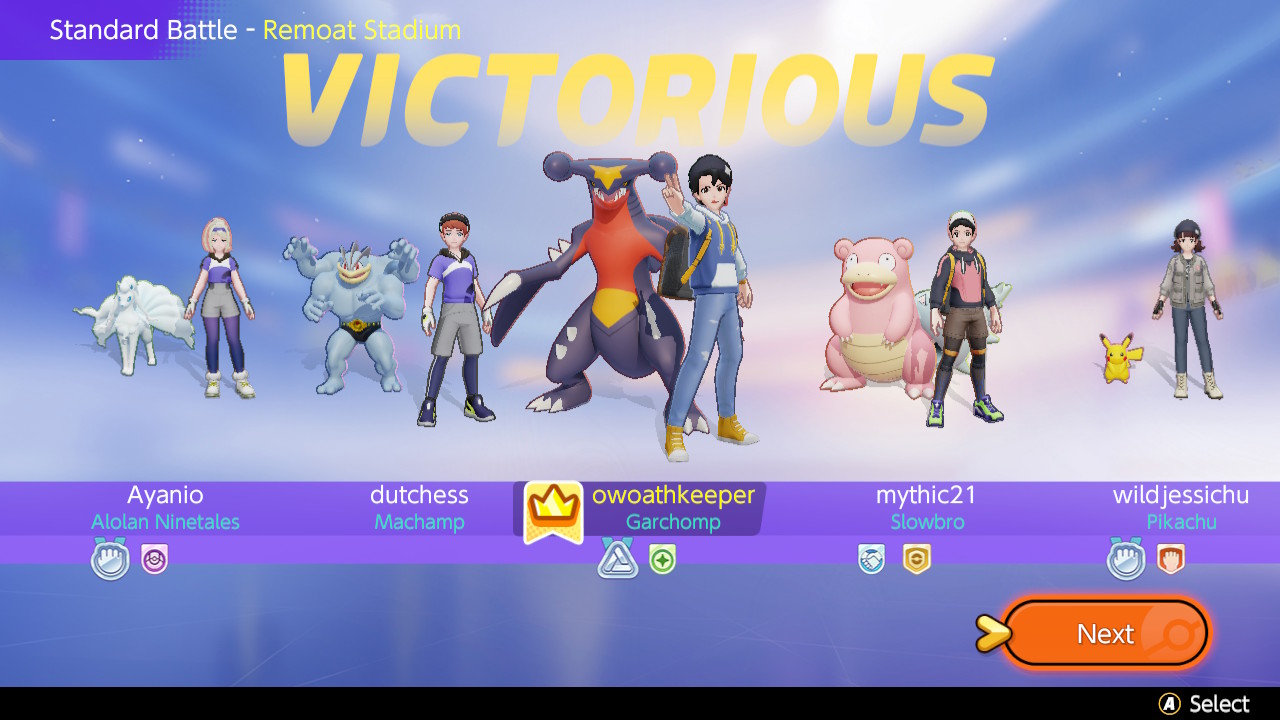
In a lighter example, adding big round googly eyes to random things just makes them more fun!
In Pokémon Unite, players can be recognized by their snazzy Pokémon Trainer avatars, which can be personalized so you see who you’re fighting. Not only does this allow for in-app purchases (essential for business), but also allows for personality, fashion sense, racial expression, and gender expression. As a result, a more inclusive community feels welcome to playing, friendly to racial minorities, women, queer communities, and men who are comfortable expressing beyond normative male presentation.
Scoring
A big source of contention during a match can be judging your teammates’ performance in real time. Anecdotally, in League, people would rage at a player dying to the enemy players and giving them more experience points with the alleged claim they are supporting the enemy team, known as “feeding” halfway through a match. It is possible they claim the player is doing so deliberately to spite their teammates, or non-deliberately, out of incompetence, but in any case, this creates tension with the allegedly low performing player, and lowering the morale of the rest of the team.
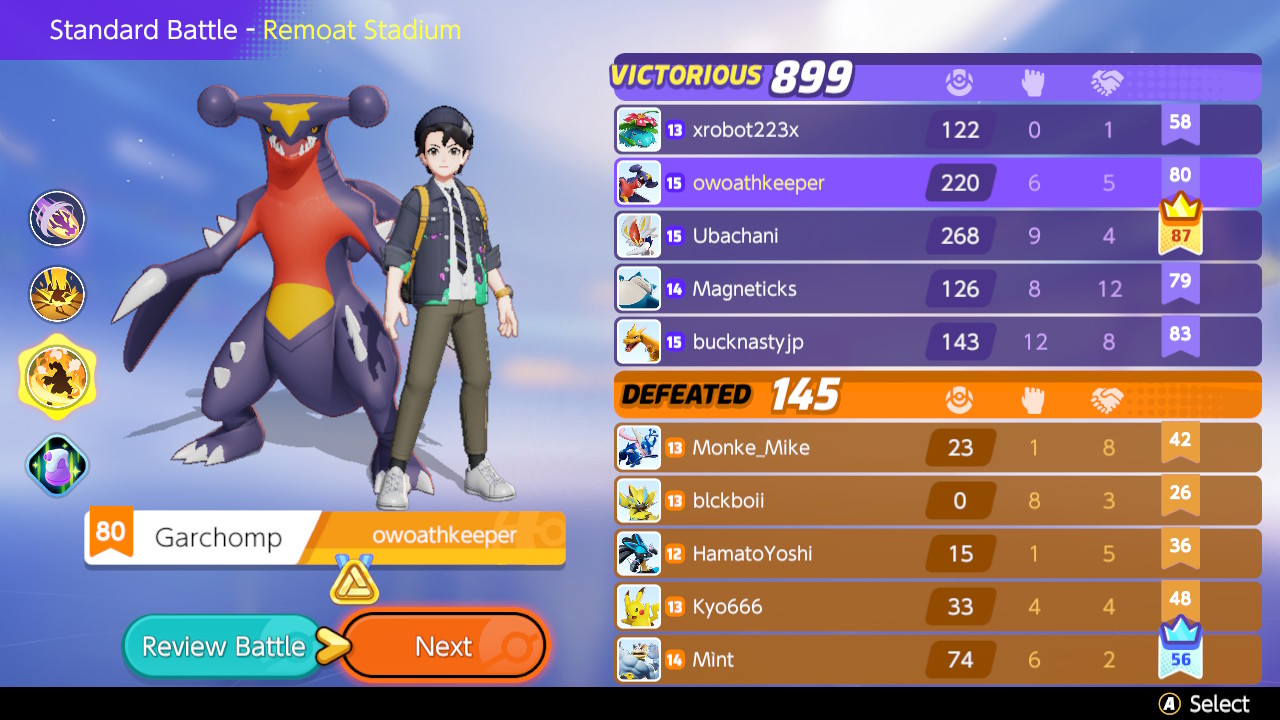
In Pokémon, scores are not viewable so online randos cannot flame their teammates in real time until the end of the match, which, as previously noted, has ended after a short 10 minutes, with limited communication. Additionally, tallies are kept on KOs and assists, but not on deaths, so people can’t get angry at how many times players are dying unless they’re specifically keeping tabs, which is unfeasible and/or not worth the effort in a solo queue.
An Overall Lighter Game
Overall, several of the game’s mechanics in Pokémon Unite are lighter, which help to make that tension in the short time span even lighter, while still having the team-based gameplay MOBA kick.
In League, the game has arrays of powerful towers, which quickly kill you if you step under an enemy tower without mindfully managing your health, a common mistake for newer players. In Pokémon, goal zones, which replace towers, are more forgiving in comparison. Goal zones may be scored upon, as previously mentioned, but also heal your opponent, and slow you down. As such, you are more lightly punished for diving, and less likely to feed as a noob.
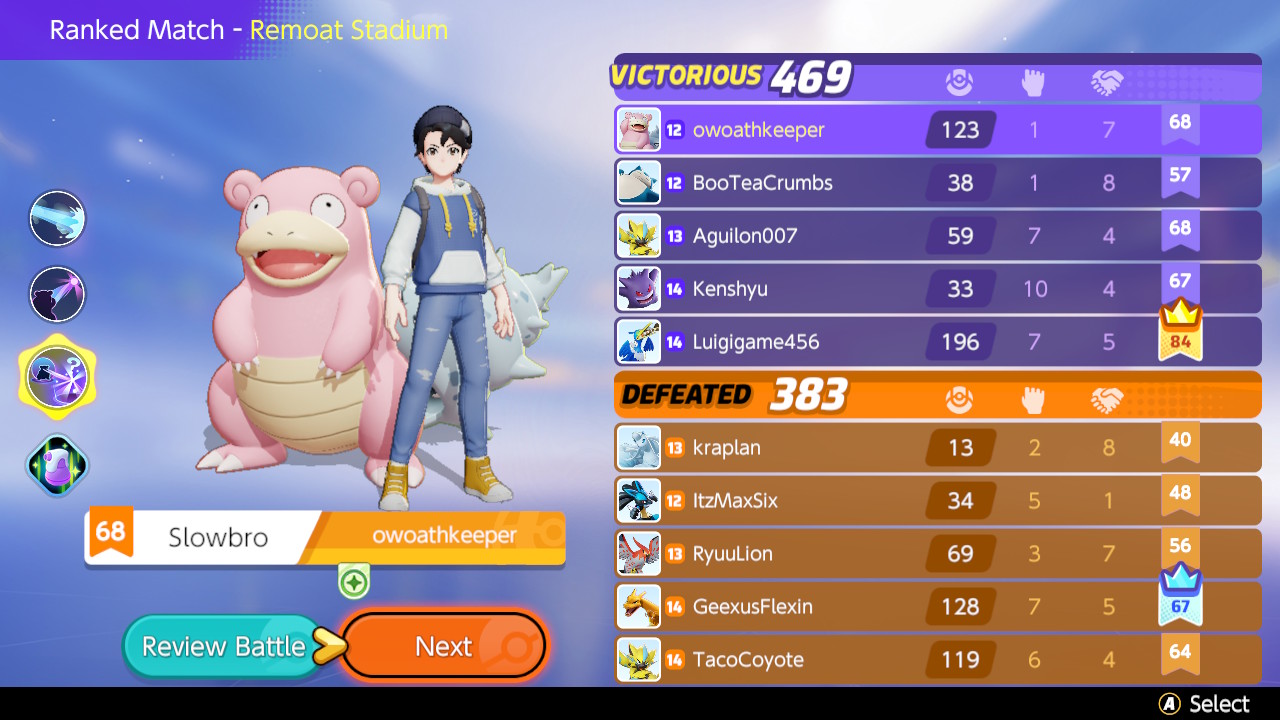
In League, there’s a bevy of creep management which involves a lot of micromanagement, whereas in Pokémon there’s only a handful of wild Pokémon on the map, who don’t push for tower, and sit idly on the map.
In Pokémon Unite, item loadouts are simpler. Abilities don’t cost mana, unlike League, but cooldowns must be managed.
Pokémon Unite might feel like a Strawberry Tart. Short, sweet, allows you to feel a little guilty, doesn’t overstay its welcome, and if you want more you can always grab another.
League of Legends feels like a chocolate mousse ice cream cake in a wide range of slices, makes you enjoy it in the moment, but if you can’t stop yourself from having just a bit too much, you’ll have deep regret afterwards.
The nature of relationships and addiction
Can a game break a relationship like other addictions can?
There’s not a lot of scientific evidence for something that specific, but there’s certainly scientific curiosity around how severe gaming might affect relationships.
The American Psychiatric Association’s DSM-5 recently added “internet gaming disorder” in the section for further research. In order to be diagnosed, it notes that gaming must cause “significant impairment or distress” in several aspects of a person’s life, including but not limited to the following:
- Continuing to game despite problems
- Deceiving family members or others about the amount of time spent on gaming
- The use of gaming to relieve negative moods, such as guilt or hopelessness
- Risk, having jeopardized or lost a job or relationship due to gaming
Design wise, we’ve discussed about how there are creative decisions which made a game less addictive, more personable, and less tense. Anecdotally, it certainly had an effect on my relationship.
But how much of that had to do with me, being an undeveloped human being with tons of problems? What if I was born in an era without video games or computers? Would I have simply found another addiction instead? Isn’t the underlying issue what’s more important than the behavior?
Gaming and love
People are in all different stages of development in our lives, and when something comes across our path, sometimes a person, sometimes a product. They interact with us, and we remain engaged based on our hopes and dreams, as well as our fears and vulnerabilities. Both games and relationships empower the best parts of us, but also expose and exploit the darker sides of us. In a lot of ways, I’ve outgrown League. And in a lot of ways, I am not the person that I was in my early 20s. That relationship ended the way many relationships end in your early 20s, two people from imperfect circumstances, feeling the promise of trying to accomplish something perfect, finding disappointment in each other, but mostly in themselves.
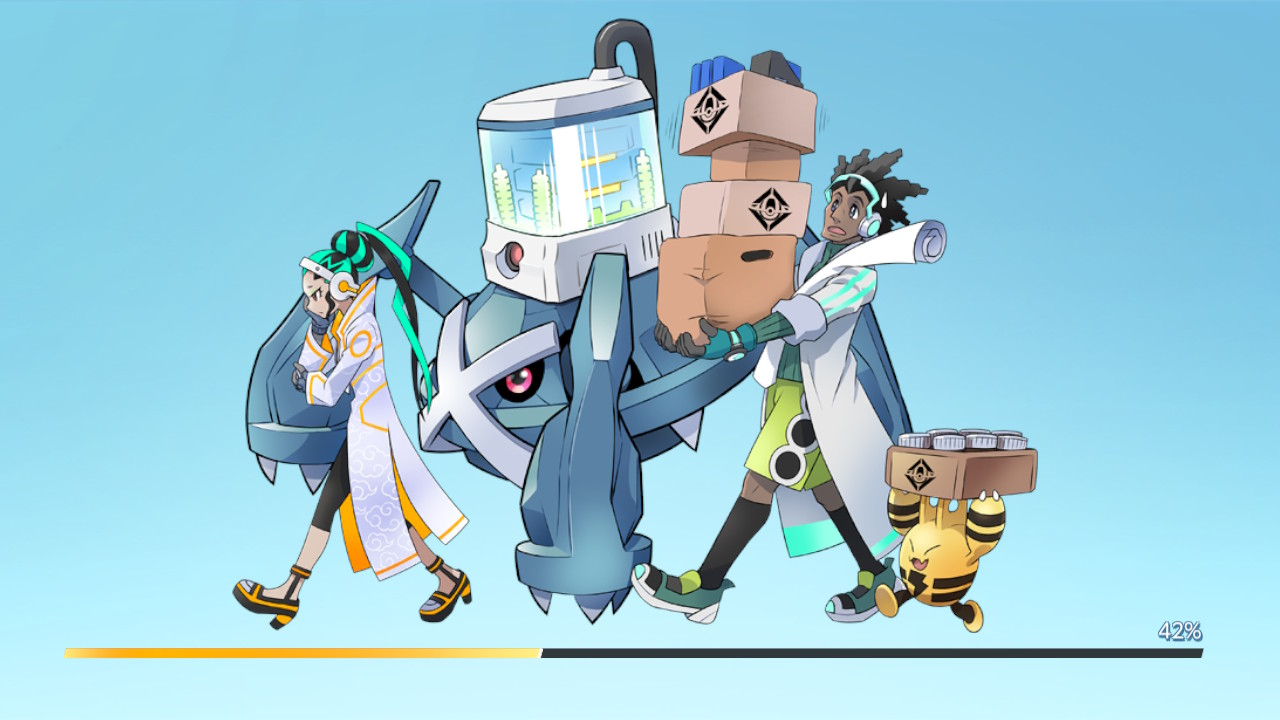
I had wanted to finish this piece discussing a bit about how toxic relationships with games are similar to toxic deep partner relationships, that maybe relationships could be designed in a way for happier, healthier connections like games can, but as I revisited Alain de Botton’s Essays in Love for the purposes of this, it seems like games are no comparison to the multifaceted nature of relationships. Toxicity can often take the form, as de Botton says, “I hate you because I love you… I hate having no choice but to risk loving you like this.”
Sometimes, you hate someone because of how much you love them.
But games don’t ever say the same thing back to you.
Games never say something back like de Botton would put it as, “it’s nice being able to feel like I can hate you like this”. Games don’t do something as fearful or as vulnerable as wanting “to test each other’s capability for survival: only… [trying] in vain to destroy one other [in order to] know we were safe.” Games can test how fit we are at being safe to other people, sure. But games can never bear themselves to us that other people can.
Humans are the most complex objects in the known universe, not because of math, or calculations, or pathfinding, or even design or creativity. But because our greatest strength is also our greatest weakness. It’s hard wired inside of us to feel the beauty of leaving ourselves vulnerable to each other, and dare to love, and be loved, and have enough faith in each other to be completely and utterly destroyed by one another. And we find ourselves needing to do it to live each and every moment of every day, in our relationships with loved ones and beyond.
So while Pokémon Unite’s game design might hurt you less than League’s would, and could be even more pleasurable to you than League is…
Maybe something all games can do is hurt us, without ever being afraid of being hurt back by us. And having power over that is something no designer should ever take lightly.






2 thoughts on “Why You Won’t Break Up With Your Girlfriend Over Pokémon Unite: A Design Analysis”